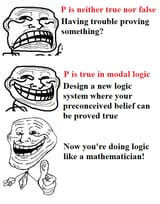>>16692642 (OP)>It says that soemwhere out there there's a number that we can't prove exists? but how do we know that it's really out there if we can't prove it?You have hit with the common misconception pseuds have when trying to bring the theorem into discussion.
But correcting you first, you're obfuscating the theorem by saying there are numbers that we can't prove that exists.
The actual pseud claim is that there are true statements in any axiomatic system that can't be proven true within the system. That's a poorly formulated statement that as is, isn't true.
The actual result of the theorem is that there are statements that can't be proven true or false, that can be formed with the language used in the axiomatic system. It doesn't mean that there are things that are true and cannot be proven, it quite literally means that you can't prove it true or false, and that isn't a hole, it means that there are statements that no matter how you look at it it's not gonna be true in general unless you add an axiom that says it is false or it is true.
So your intuition that "how do we know that it's really out there if we can't prove it?" agrees with what I think too, the vague statement faggots make when bringing up this theorem doesn't really follow from this theorem, as from outside the axiom system, the statement can be made true or false.
One such case predicted by this theorem, is the choice axiom (seen as a statement, though it has "axiom" in its name), it's known that it cannot be proven true or false under a certain axiom system. Mind you that that wasn't proved with Godel's incompleteness theorem. Since Godel's theorem only tells you that any axiom system has those statements, it doesn't tell you how they are found.
Godel or whoever else might have originally formulated it with or changed it to be "numbers" instead of statements from formal logic, but that IMO obfuscates the real meaning.






